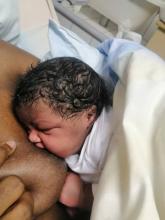Working mothers’ share their breastfeeding experiences
When Maria Amateta gave birth to her first baby at 29 years, she lacked the experience and commitment to breastfeed her newborn exclusively for six months.
In fact, Amateta was so occupied with pursuing a nursing qualification that most of her time was spent away from her daughter.
Six years later, with the birth of her second child, a boy, Amateta decided that she would dedicate more time to breastfeeding - not because she had more time to her hands but because she better understands the benefits of breastfeeding.
“This time I decided to breastfeed exclusively for six months,” she says. Her decision to breastfeed her son who is now 16 months old paid off almost immediately because she noted a “big difference” in the first six months of her son’s life.
“I saw that my son was picking up weight easily,” Amateta relates. She also observed that her son was not vomiting like her daughter.
“I don’t know if the formula milk was not well prepared (with daughter), but my son does not vomit at all,” says Amateta.
“I have observed that most kids that are breastfed gain weight fast and they don’t suffer from diarrhea and vomiting,” says Amateta.
Cassia Sharpley, Miss Namibia 2022, who is also the WHO Namibia’s 75th Anniversary Champion agrees that breastfeeding helps to protect babies against long-term and short-term diseases.
Therefore: “Communities should be motivated to come together and implement a culture of breastfeeding as a means of protection for mothers, children and the nation at large,” Sharpley noted.
According to the World Health Organization (WHO) data fewer than half of infants under six months old are exclusively breastfed.
This is because many women lack the moral support to exclusively breastfeed their babies, says Amateta.
“At times breastfeeding is a challenge on its own because some mothers just don’t know how to latch a baby onto the breast and others don’t even know when the baby is full,” says Amateta who is now a nurse at the Karibib Health Centre. She notes that this is especially true for first time mothers.
As a result, the Karibib Health Centre has introduced the idea of a ‘breastfeeding corner’ at the facility. The idea is to help mothers who are struggling to breastfeed their babies.
The breastfeeding corner will allow mothers to nourish their babies with the assistance of the nurses at the facility, explained Amateta, who did not have this privilege with her first child.
While the breastfeeding corner at the facility is not intended for employees, Amateta shared that she has received tremendous support from her colleagues serving as an encouragement to keep breastfeeding.
“When I was on maternity leave, I expressed enough milk to store in the freezer for my baby,” explains Amateta.
But her colleagues also allow her to go home during lunch breaks, tea breaks and emergencies to feed her baby.
“Even when I introduced my son to solid foods, I continued to breastfeed him because I have the support in place,” she explained.
The WHO found that more than half a billion working women globally are not given essential maternity protections in national laws.
Also, just 20 percent of countries require employers to provide employees with paid breaks and facilities for breastfeeding or expressing milk.
Amateta wants more employers to allow working mothers to spend more time with their children. “They should either create space for women to express their milk at the workplace or allow women to go home and breastfeed during the day,” Amateta says.
Yvonne Kandakuzee, a Human Resources Assistant at WHO Namibia agrees that creating an environment where breastfeeding mothers are given time off to breastfeed their babies is an investment for families and organizations in the long term.
Babies who are breastfed exclusively are generally healthy. This also means that mothers will likely take less time off work to tend to their sick children, explained Kandakuzee. Kandakuzee, a mother of a now 18-months old girl, exclusively breastfed her daughter for six months.
At the time, she was unemployed and that allowed her to spend time with her daughter. Kandakuzee got a job when her infant was seven months old. She continued to breastfeed her child even while working.
“What enabled that was a work environment that allowed me to do flexible work. I would get lunch between 12:00 and 14:00. So, the lunch hour was dedicated to breastfeeding,” said Kandakuzee.
Meanwhile, Tracey Kameeta, a 33-year-old mother says that while her employer was supportive of her going back home during work hours to breastfeed her now 11 months old daughter, exclusive breastfeeding was not an option for her.
“I introduced my baby to formula milk because I had to go back to work. When you express milk, you have to freeze it and I don’t have a freezer. But, my employer had no problem with me going back home to breastfeed. My baby struggled to take formula milk, so I had no choice but to go home to breastfeed,” says Kameeta who lives at Goreangab informal settlement in Windhoek.
The WHO Director-General, Dr Tedros Adhanom Ghebreyesus and UNICEF Executive Director, Catherine Russell released a joint statement on the occasion of Breastfeeding Week 2023 (August 1-7).
They called on governments to increase investments in breastfeeding support policies and programs in all settings, including a national policy and program that regulates and promotes public and private sector support to breastfeeding women in the workplace.



